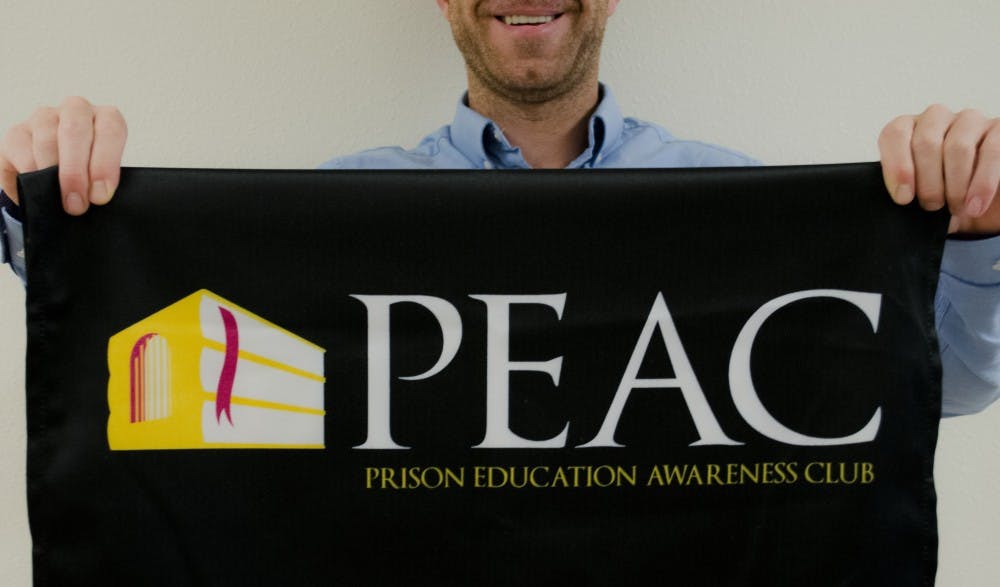 Eric Verska holds up the banner that encompasses the PEAC club. Photo by Luu Nguyen
Eric Verska holds up the banner that encompasses the PEAC club. Photo by Luu Nguyen“My experience was essentially just a warehouse of people behind barbed wire fences,” finance senior Eric Verska said. “We’re just sitting there idling, time’s going by. We’re not learning how to reintegrate into society. We’re not learning how to be productive members of society.”
Verska, is dressed in a blue button down and jeans. At first impression, his current lifestyle doesn't seem to match his backstory.
“Fortunately, I was blessed with the opportunity to take distant learning classes and kind of grow personally,” Verska said. “However, a lot of the people don’t have that.”
Four years ago, the Prison Education Awareness Club (PEAC) was created at Arizona State University. The club branched off of the Pen Project internship (ENG 484) where students critique writing submissions from prison inmates.
“The club formed because there were interns who didn’t want to fall away from being in touch with everyone and wanted to be a part of an awareness club,” English professor and PEAC advisor Cornelia Wells said.
Current PEAC President, Jessica Fletcher first met Wells in her English 102 class. After reading some of Fletcher’s writing, Wells introduced her to the Pen Project. Fletcher went on to spend two years in the program.
“They kind of joke around and say you get prison fever because once you get into an issue you can’t not be part of it and not want to do something about it,” Fletcher said.
This past summer Fletcher also received the opportunity to teach a creative writing workshop to a group of inmates.
“I was still very nervous,” Fletcher said. “Half because of the situation cause it’s super max and half because I was nervous about being a teacher. But they were so engaged and so excited about leaning communication skills and creativity that for me this was really a rewarding experience.”
Verska, who joined the club last year and is this year’s financial officer became involved with the club after his mom, who worked for ASU’s English department, discovered a newsletter that discussed the English department’s involvement with the prison systems. Having gone through a similar situation, Verska felt a desire to be a part of the cause.
“I’m an asset (to PEAC) in that I’ve been through the prison system,” Verska said. “Then I got an education while I was in prison, so I’m kind of what we hope for people to get from being educated while they’re incarcerated. It’s a real life example of how people can benefit from education.”
Roberta Noreles is a correction education program teacher for the Arizona Department of Corrections. Noreles teaches GED classes to inmates who are on a level five yard. Inmates on a level five yard are on either death row or total lockdown. Noreles recently attended the Pen Project’s orientation where she spoke to students participating in the program about working with inmates.
“Inmates are very creative and they love to write,” Noreles said. “They write all the time, to their girlfriends, their guardians, their mothers, their sisters, their brothers… so what this project is doing is turning their writing into a creative way to express themselves.”
PEAC’s main resource for bringing awareness to prison education is through an annual conference where the club invites keynote speakers to discuss these issues. This past year the conference was held at University Club and speakers from across the country included a man from New York who served 16 years in prison himself and is now a director of an outreach program that provides higher education to inmates as well as representatives from Arizona’s Department of Corrections.
This year the club hopes to expand the conference as well as invite keynote speakers to each club meeting. By providing more opportunities for students to hear about the prison education system, they’re hoping more and more people will become aware of the issues.
“I realize that a lot of people are closed-minded about this subject matter, but it’s a domino type of situation,” Verska said. “Not only are these people in prison, but there are family and friends that are affected by what they’ve done. If a person can rehabilitate, educate and learn to believe in themselves and accomplish things, it blossoms. It touches a lot of people.”
Reach the writer at mchavan1@asu.edu or via Twitter @chavanmanali72.




